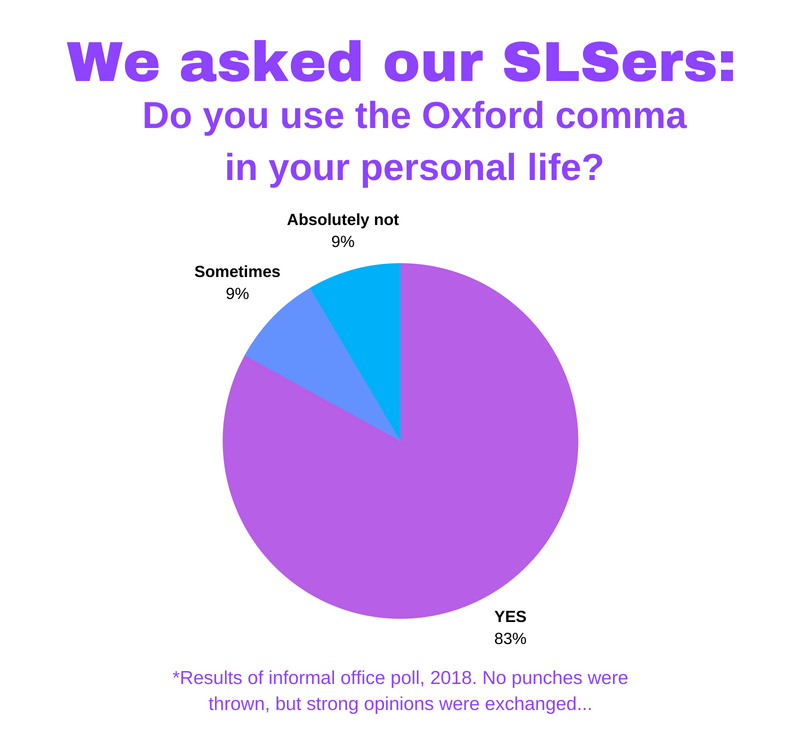We at SLS Consulting take a strong line when it comes to punctuation—specifically, when it comes to the serial or “Oxford” comma. We like it; we use it in all our writing; and we encourage all our clients to use it as well.
What is the Oxford comma? It’s the last comma used in a list of three or more items, right before a conjunction like “and” or “or.” Some examples would be:
- Daniel is bringing a green salad, paper plates, and his winning smile to the law firm’s Christmas party.
- Pamela’s attention to detail, talent for thinking like the opposition, and former experience as a judge’s clerk make her the most popular paralegal to draft complaints.
- Jorge and his wife are wavering between taking a vacation in Fiji, the Cayman Islands, or her home country of Kazakhstan.
We believe that the Oxford comma leaves no room for mistakes or misinterpretations—and in legal internet marketing, you really can’t afford those! Imagine one of those sentences without the final comma in the sequence. In fact, here’s a well-known example that’s been seen all over the Web, as noted by Mental Floss:
“This book is dedicated to my parents, Ayn Rand and God.”
As the article’s author says, that’s one strange set of parents….An Oxford comma would definitely have clarified things, although it wouldn’t have been as funny. David Ewing, author of 1974’s Writing for Results in Business, Government, and the Professions has this to say about why you should use the Oxford comma: “The reason is the comma before the and helps the reader to see instantly that the last two items are not joined.” Unless Ayn Rand and God did at some point marry. Inasmuch as she was a notable atheist, it’s unlikely.
Another funny example of no-Oxford-comma is, “We invited the strippers, JFK and Stalin.” Do you know what your world leaders are doing in their spare time? Plus, this one comes with a cartoon, though it’s an image that few of us want in our heads.
There’s a big red book that lives at our Pasadena office, weighing in at about ten pounds, which our writing team uses to answer style questions. Garner’s Modern English Usage declares, “Whether to include the serial comma has sparked many arguments. But it’s easily answered in favor of inclusion because omitting the final comma may cause ambiguities, whereas including it never will.” Author Bryan Garner is a lawyer, educator, and lexicographer (dictionary maker). Since we at SLS write content for lawyers, it makes sense to take his advice!
That’s not to say the Oxford comma doesn’t have its detractors. Indeed, there’s hardly a piece of punctuation that brings more controversy to the English language. Even the English have no love nowadays for the Oxford comma—it’s actually more common in American English than it is in British English!
In the U.S., book and magazine publishers are generally pro-Oxford comma, while newspapers are generally anti-Oxford comma. The Chicago Manual of Style says “Yes!” and Associated Press Style says “No!” The New York Times discourages it. Maybe it’s because that extra comma used to take up more ink on the broadsheets…?
We’d be remiss not to mention that the Oxford comma won a huge victory in a recent $5 million lawsuit. Three truck drivers for Oakhurst Dairy in Portland, Maine, said that a clause in state law regarding what qualified for overtime was unclear, and that they were owed four years’ worth of overtime pay! The U.S. Court of Appeals ruled that the missing Oxford comma created enough ambiguity to side with the drivers in a drawn-out court battle, and in February 2018, the company meekly agreed to pay the drivers $5 million.
As a marketing firm for lawyers, SLS Consulting took this story very seriously! It’s not the first lawsuit over the Oxford comma, and maybe it won’t be the last. Whether you’re writing a contract, a pleading, or a settlement agreement, a mistake or ambiguity can definitely be used against your client. These details are vitally important in the practice of law, and the extra comma costs you nothing. Why wouldn’t you want that tiny extra layer of clarity in all your writing?
Plus, it sounds better. When questioned, one of our unbiased family members said, “I always feel the need to pause before ‘and.’ It just feels more natural for speaking. That’s why I’m an Oxford comma man.”
And we at SLS Consulting are Team Oxford Comma. Join us, and make sure your content is absolutely clear for readers!
Just a Few Authorities Who Like the Oxford Comma:
Garner’s Modern English Usage
The Elements of Style
The Chicago Manual of Style
Oxford University Press (of course)
A Decent Argument for Why the Oxford Comma Doesn’t Matter (Much):
LA Times’s A Word, Please: An Oxford comma could strip JFK’s dignity
Categories:
- Ask SLS
- Bail Bonds
- Community
- Google My Business
- Google Updates
- Holidays and Other Fun Stuff
- Law Firm Management
- Legal Online Marketing
- Local Search
- Marketing Tips
- Ms. White Hat’s SEO Corner
- Online Brand Development
- Online Content Development
- Online Review Sites
- Search Engine Optimization
- SLS News
- Social Media Marketing
- Video Marketing
- Website Design


